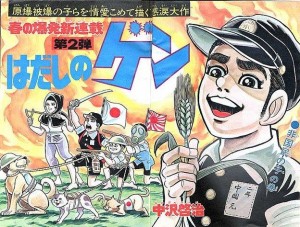 Keiji Nakazawa’s internationally renowned manga Barefoot Gen, which depicts wartime atrocities from the perspective of the seven-year-old protagonist, has been pulled from primary and middle school libraries in the Japanese city of Matsue. Citing “portions that warrant consideration as appropriate reading material for children,” school officials have barred students from checking out the manga but allowed teachers to continue using it in classrooms.
Keiji Nakazawa’s internationally renowned manga Barefoot Gen, which depicts wartime atrocities from the perspective of the seven-year-old protagonist, has been pulled from primary and middle school libraries in the Japanese city of Matsue. Citing “portions that warrant consideration as appropriate reading material for children,” school officials have barred students from checking out the manga but allowed teachers to continue using it in classrooms.
Barefoot Gen is loosely based on Nakazawa’s own childhood, as his father, two sisters, and a brother were killed in the atomic bombing of Hiroshima when he was seven years old. The book shows bomb victims “with their skin rotting and falling off their bodies…while others are seen dismembered,” but it also does not shy away from atrocities committed by Japanese troops in other Asian countries. It was these events, such as the Rape of Nanking and “a publicized account of two soldiers aiming to kill 100 Chinese citizens first in a contest,” that caused one Matsue citizen to challenge the book’s presence in schools. Many Japanese nationalists deny that such war crimes were ever committed by their country’s troops. Matsue’s board of education did not address the history revisionism behind the challenge, but instead said that the manga may be too graphically violent for children to read on their own.
Nakazawa died of lung cancer last year, but his widow Misayo said he felt strongly “that he must share with children accounts of the miseries of the war and the atomic bombing to prevent a recurrence.” To aid in this effort, he donated 2,735 original drawings from the manga and 30 boxes of other materials to the Hiroshima Peace Memorial Museum. Tomoko Watanabe of the nonprofit peace group ANT-Hiroshima said that Nakazawa’s message successfully connected with young readers: “The work does describe brutal scenes, but children are intrinsically able to get to the essence of the story — that people should live despite the difficulties. We must trust the children and let them read as they want to.” Instead, Matsue officials apparently prefer to shield students from real-life events and risk the realization of Nakazawa’s worst fear for a new generation.
“It is always distressing to see censorship occur and doubly so when the material being censored is a classic work of the highest merit,” says CBLDF Executive Director Charles Brownstein, who first heard of the ban last Sunday while exhibiting at Comitia at Tokyo Big Sight. “It is deeply disturbing that students are being deprived of this invaluable text.”
Brownstein spent last week in Tokyo, speaking on issues pertaining to manga freedom, lecturing at Comiket 84 and an international symposium on free expression and manga. He says, “Many individuals and insiders I spoke to at Comitia voiced serious concern about the ban on Barefoot Gen. Several were disturbed that one of the most important works of 20th century anti-war literature was removed from school libraries. This mirrors concerns CBLDF faces as part of our work on the Kids’ Right to Read Project and is a clear illustration of why it’s important to increase the discussion about intellectual freedom issues affecting comics, both in the States and internationally.”
Please help support CBLDF’s important First Amendment work by making a donation or becoming a member of the CBLDF!
Maren Williams is a reference librarian who enjoys free speech and rescue dogs.